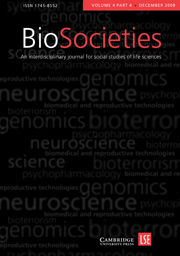Crossref Citations
This article has been cited by the following publications. This list is generated based on data provided by
Crossref.
Hoeyer, Klaus
2008.
The Ethics of Research Biobanking: A Critical Review of the Literature.
Biotechnology and Genetic Engineering Reviews,
Vol. 25,
Issue. 1,
p.
429.
Salvaterra, Elena
Lecchi, Lucilla
Giovanelli, Silvia
Butti, Barbara
Bardella, Maria Teresa
Bertazzi, Pier Alberto
Bosari, Silvano
Coggi, Guido
Coviello, Domenico A
Lalatta, Faustina
Moggio, Maurizio
Nosotti, Mario
Zanella, Alberto
and
Rebulla, Paolo
2008.
Banking together.
EMBO reports,
Vol. 9,
Issue. 4,
p.
307.
Secko, David M.
Preto, Nina
Niemeyer, Simon
and
Burgess, Michael M.
2009.
Informed consent in biobank research: A deliberative approach to the debate.
Social Science & Medicine,
Vol. 68,
Issue. 4,
p.
781.
Liu, Yue
2009.
The principle of proportionality in biometrics:Case studies from Norway.
Computer Law & Security Review,
Vol. 25,
Issue. 3,
p.
237.
Hoeyer, Klaus
2009.
The Ethics of Research Biobanking.
p.
237.
Bygrave, Lee A.
and
Schartum, Dag Wiese
2009.
Reinventing Data Protection?.
p.
157.
Rothmüller, Ninette
2010.
Transparenz.
p.
177.
Hawkins, Alice K.
2010.
Biobanks: Importance, Implications and Opportunities for Genetic Counselors.
Journal of Genetic Counseling,
Vol. 19,
Issue. 5,
p.
423.
Walmsley, Heather
Burgess, Michael
Brinkman, Jacquelyn
Hegele, Richard
Wilson‐McManus, Janet
and
McManus, Bruce
2010.
Pharmaceutical Sciences Encyclopedia.
p.
1.
Sheehan, M.
2011.
Can Broad Consent be Informed Consent?.
Public Health Ethics,
Vol. 4,
Issue. 3,
p.
226.
Hens, Kristien
Nys, Herman
Cassiman, Jean-Jacques
and
Dierickx, Kris
2011.
Risks, Benefits, Solidarity: A Framework for the Participation of Children in Genetic Biobank Research.
The Journal of Pediatrics,
Vol. 158,
Issue. 5,
p.
842.
Meslin, Eric M.
and
Garba, Ibrahim
2011.
Biobanking and public health: is a human rights approach the tie that binds?.
Human Genetics,
Vol. 130,
Issue. 3,
Hawkins, Alice K
and
O'Doherty, Kieran C
2011.
"Who owns your poop?": insights regarding the intersection of human microbiome research and the ELSI aspects of biobanking and related studies.
BMC Medical Genomics,
Vol. 4,
Issue. 1,
Broström, Linus
and
Johansson, Mats
2011.
Translational Stem Cell Research.
p.
237.
Hens, Kristien
Cassiman, Jean-Jacques
Nys, Herman
and
Dierickx, Kris
2011.
Children, biobanks and the scope of parental consent.
European Journal of Human Genetics,
Vol. 19,
Issue. 7,
p.
735.
Hug, Kristina
Hermerén, Göran
and
Johansson, Mats
2012.
Withdrawal from Biobank Research: Considerations and the Way Forward.
Stem Cell Reviews and Reports,
Vol. 8,
Issue. 4,
p.
1056.
Hoeyer, Klaus
2013.
Exchanging Human Bodily Material: Rethinking Bodies and Markets.
p.
99.
Valkenburg, Govert
2013.
Technoethics and Public Reason.
International Journal of Technoethics,
Vol. 4,
Issue. 2,
p.
72.
Hoeyer, Klaus
and
Hogle, Linda F.
2014.
Informed Consent: The Politics of Intent and Practice in Medical Research Ethics.
Annual Review of Anthropology,
Vol. 43,
Issue. 1,
p.
347.
D'Abramo, Flavio
2015.
Biobank research, informed consent and society. Towards a new alliance?.
Journal of Epidemiology and Community Health,
Vol. 69,
Issue. 11,
p.
1125.


